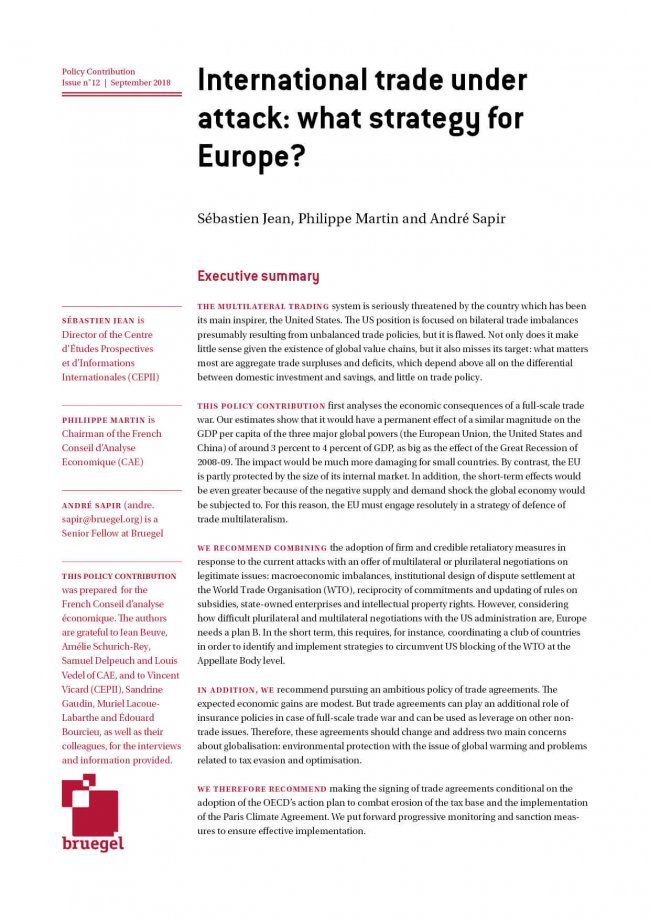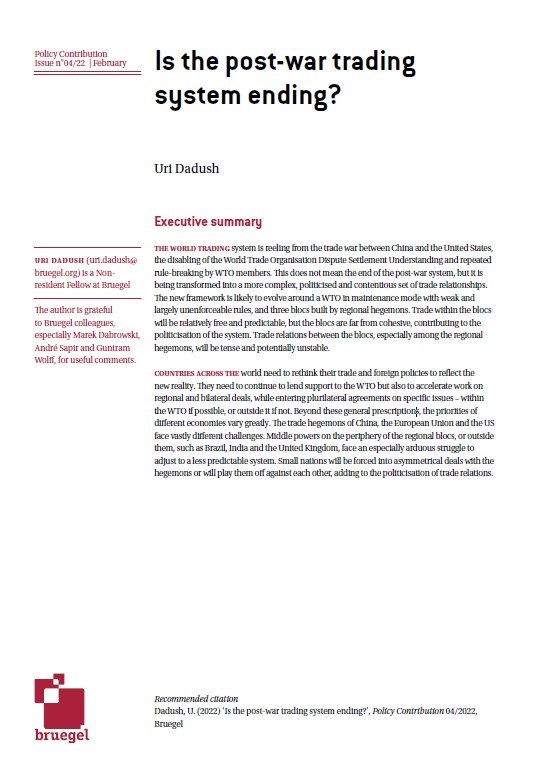Policy Contribution
International trade under attack: what strategy for Europe?
This Policy Contribution analyses the economic consequences of a full-scale trade war. The US position, focusing on bilateral trade imbalances presumably resulting from unbalanced trade policies, is seriously threatening the multilateral trading system. The authors estimate the impact would be damaging for everyone. Though the EU is partly protected by the size of its internal market, it must engage resolutely in a strategy of defence of trade multilateralism.
This policy contribution
was prepared for the
French Conseil d’Analyse
Économique.
The multilateral trading system is seriously threatened by the country which has been its main inspirer, the United States. The US position is focused on bilateral trade imbalances presumably resulting from unbalanced trade policies, but it is flawed. Not only does it make little sense given the existence of global value chains, but it also misses its target: what matters most are aggregate trade surpluses and deficits, which depend above all on the differential between domestic investment and savings, and little on trade policy.
This Policy Contribution first analyses the economic consequences of a full-scale trade war. Our estimates show that it would have a permanent effect of a similar magnitude on the GDP per capita of the three major global powers (the European Union, the United States and China) of around 3 percent to 4 percent of GDP, as big as the effect of the Great Recession of 2008-09. The impact would be much more damaging for small countries. By contrast, the EU is partly protected by the size of its internal market. In addition, the short-term effects would be even greater because of the negative supply and demand shock the global economy would be subjected to. For this reason, the EU must engage resolutely in a strategy of defence of trade multilateralism.
We recommend combining the adoption of firm and credible retaliatory measures in response to the current attacks with an offer of multilateral or plurilateral negotiations on legitimate issues: macroeconomic imbalances, institutional design of dispute settlement at the World Trade Organisation (WTO), reciprocity of commitments and updating of rules on subsidies, state-owned enterprises and intellectual property rights. However, considering how difficult plurilateral and multilateral negotiations with the US administration are, Europe needs a plan B. In the short term, this requires, for instance, coordinating a club of countries in order to identify and implement strategies to circumvent US blocking of the WTO at the Appellate Body level.
In addition, we recommend pursuing an ambitious policy of trade agreements. The expected economic gains are modest. But trade agreements can play an additional role of insurance policies in case of full-scale trade war and can be used as leverage on other non-trade issues. Therefore, these agreements should change and address two main concerns about globalisation: environmental protection with the issue of global warming and problems related to tax evasion and optimisation.
We therefore recommend making the signing of trade agreements conditional on the adoption of the OECD’s action plan to combat erosion of the tax base and the implementation of the Paris Climate Agreement. We put forward progressive monitoring and sanction measures to ensure effective implementation.










